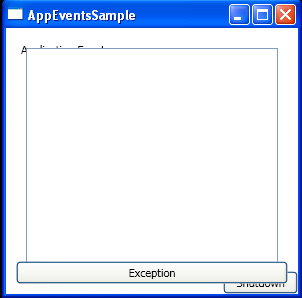Exit current action with Application.Current.Shutdown

<Window x:Class="WpfApplication1.Window1"
xmlns="http://schemas.microsoft.com/winfx/2006/xaml/presentation"
xmlns:x="http://schemas.microsoft.com/winfx/2006/xaml"
Title="AppEventsSample" Height="300" Width="300">
<Grid>
<Button Height="23" x:Name="shutdownButton" VerticalAlignment="Bottom" HorizontalAlignment="Right" Width="75">Shutdown</Button>
<Label Height="25" HorizontalAlignment="Left" Margin="10" x:Name="label1" VerticalAlignment="Top" Width="100">Application Events:</Label>
<ListBox Margin="20" x:Name="eventsListBox" ItemsSource="{Binding}" />
<Button Height="23" Margin="10" Name="exceptionButton" VerticalAlignment="Bottom">Exception</Button>
</Grid>
</Window>
//File:Window.xaml.cs
using System;
using System.Collections.Generic;
using System.Text;
using System.Windows;
using System.Windows.Controls;
using System.Windows.Data;
using System.Windows.Documents;
using System.Windows.Input;
using System.Windows.Media;
using System.Windows.Media.Imaging;
using System.Windows.Shapes;
namespace WpfApplication1 {
public partial class Window1 : System.Windows.Window {
public Window1() {
InitializeComponent();
// this.DataContext = ((App)Application.Current).EventLog;
}
protected override void OnInitialized(EventArgs e) {
base.OnInitialized(e);
exceptionButton.Click += new RoutedEventHandler(exceptionButton_Click);
shutdownButton.Click += new RoutedEventHandler(shutdownButton_Click);
}
void exceptionButton_Click(object sender, RoutedEventArgs e) {
throw new Exception("Opps! Unhandled exception!");
}
void shutdownButton_Click(object sender, RoutedEventArgs e) {
Application.Current.Shutdown(111);
}
}
}
Related examples in the same category